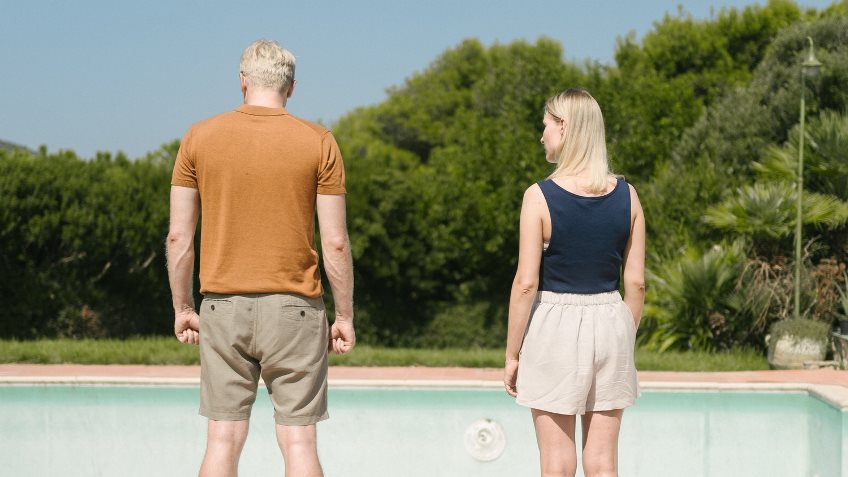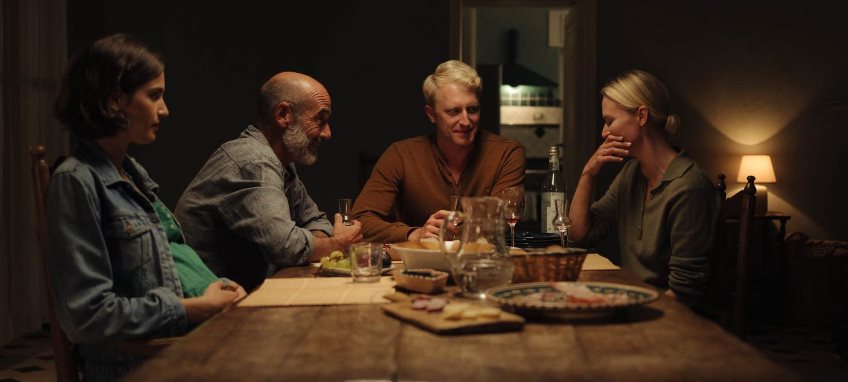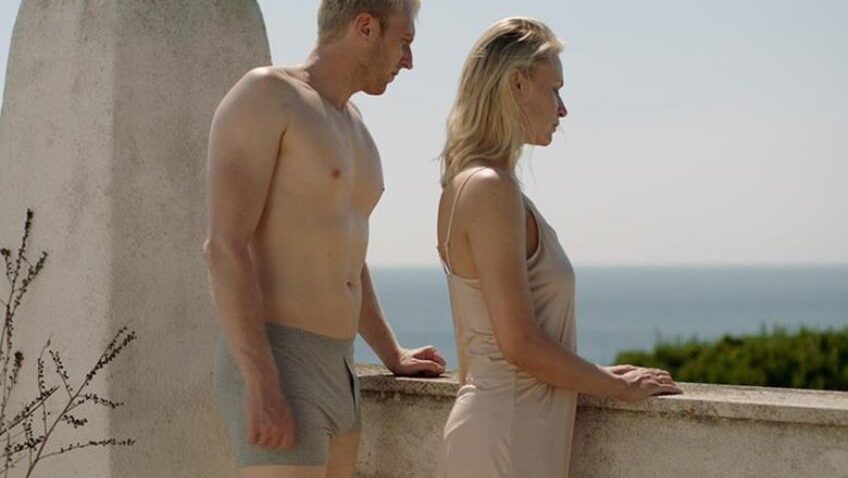Joyce Glasser reviews Silent Land (September 16, 2022) Cert 15, 113 mins.
Silent Land exudes an ominous sense of dread, has a subtle environmental theme, clever foreshadowing and bags of potential, although it drags in the middle and its central protagonists are cold to the point of impenetrable.
First time feature director Agnieszka Woszczynska manages to integrate her topical socio-political messages within the context of an atmospheric drama. She sends her protagonists, a cosseted Polish couple, to the fragile Sardinian coast and watches them fall apart. They arrive entitled and superior. Gradually their prejudice and wobbly moral compass emit echoes from history: from the recent Polish-Belarusian border conflict to the aftermath of World War I and to the second World War.
Tall, trim, blond and discreetly dressed in neutral colours, Adam (Dobromir Dymecki) and Anna (Agnieszka Zulewska) look like Teutonic statues rather than an overworked Polish couple, but they become real enough when tested by an incident so minor to them that they try to brush it off. Exhausted from their high powered life in Poland and the gloomy weather, they seek refuge in a white stucco holiday rental villa, protected by CCTV cameras.
As they unpack, the couple, unaware there is a water shortage on the island, complain to the landlord, Fabio (Marcello Romolo) that the swimming pool is empty. He points to the private beach and enticing turquoise sea outside their door, but they argue that since they paid for the house with pool, they want the pool fixed. It’s not all that you have, but what you don’t and could have that matters.

As they sit down to dinner that evening, Anna asks her husband if she were not too harsh with Fabio. ‘I like it when you’re like that,’ Adam purrs amorously, before reassuring her: ‘That’s his job.’ And then rationalising her actions disingenuously: ‘we wouldn’t make it in this heat without a pool.’
This statement ignores the sea – preferable to any pool – outside and the fact that we see the couple jogging every day before lunch, when it should be too hot for such activity. There is also a shot of the refrigerator door left open, wasting electricity.
The following day the couple are awoken by a loud drilling noise and meet an Arab migrant worker (Ibrahim Keshk), who has come to fix the pool. They are concerned about theft and locking the villa, but the only illegal entrant is a mangey dog licking scraps from their plates. Later in the film, that dog reappears in a symbolic encounter with Adam.
But bigger problems emerge when the friendly contractor has an accident. He is found dead in the bottom of the pool. The couple call Fabio who calls an ambulance and the police.
When questioned by the police on two occasions the couple’s testimony is contradicted by the very CCTV cameras that reassured them for their safety. It seems they were on the terrace when the man fell into the pool and were not taking a shower and in the living room, respectively. But the police want to know why Adam did not try to help the deceased and how he knew he was dead if he did not go to his aide.
As Adam and his wife discuss excuses to use, such as her state of mind, Anna becomes concerned that Adam could have saved the man with a quicker reaction. ‘You could have moved your skinny ass to do something too,’ he says in the first sign of divided ranks, before they try to laugh it off and dance in the moonlight.

Here some viewers will be reminded of Ruben Östlund’s 2014 breakthrough satire, Force Majeure, in which a ski holiday turns frosty when a wife realises that her husband abandoned her, and their two children, trying to save himself when an avalanche strikes.
As in that film, the couple’s relationship and holiday changes. Fabio introduces the couple to a dive instructor, Arnaud (Jean-Marc Barr, from The Big Blue) – who is a citizen of the world, from “everywhere,” and his pregnant, much younger wife Claire (Alma Jodorowsky, paternal granddaughter of Chilean filmmaker Alejandro Jodorowsky). Both couples get on well, but Adam and Anna do not tell the truth about their incident, although later, Claire tells Anna that Arnaud, in need of the money, permitted a woman of dubious health to dive with devastating consequences.
Adam begins having a recurring nightmare and turns insular, while Anna delights in testing her physical limits, going on dives with Arnaud and trying to bury the dark incident in the pool in the deep ocean. The relationship with Arnaud and Claire feels underdeveloped and fails to shed light on the Polish couple as real people as opposed to ciphers around whom Woszczynska constructs her moral fable.
Their well-ordered lifestyle continues but their sexual passion has cooled. If they wake too late for breakfast, they must plan for an early lunch. But soon there are three at the table and it is clear neither Adam nor Anna can remain protected by their indifference or the luxury of isolation.




